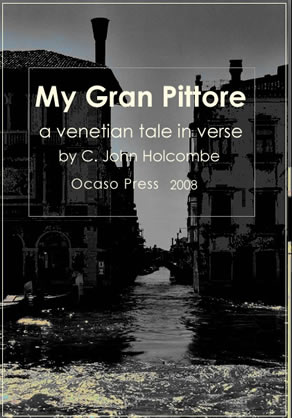Venice at the height of her glory, celebrated above all in the canvases of Veronese. But what has happened to that altarpiece commissioned from him, the one modelled on a child he had of the courtesan Antonia Schiavoni? Ten years later it has not been delivered. The new abbess calls him to account, and in the aged painter makes various excuses — until he must meet the courtesan and their daughter again, when he sees his life as great gifts misused and squandered.

The abbess reminds him of her predecessor's words, that he had too courtly and easy a gift for phrase and courtesy. The donna Antonia recalls to him their life together and the promises he made. His daughter Ana has become a pockmarked nun, and she points out to him the journey to God that all — Veronese, his mistress and she herself — must make.
An older and sadder man returns to the small church of San Sebastiano, where his canvases show him what he was once had the power to achieve.
Free ebook in pdf format.
I leave the gate and take a path that leads
through flowering marjoram and open vines.
Above are oranges and, just as then,
the periwinkles sparkle in the grass.
It seems but yesterday the years I passed
in surrogation to our sovereign Venice,
but now a summer's breath is in the wind,
and all around there seems a happiness
that clothes these festivals of countryside,
and makes our littorals of floating lights,
the fret and hubbub of our carnivals,
but working transcripts of a dream, with no
more matter to them than the tranquil clouds
have business with us but to trail on slowly
piled-up turbans opening into blue,
white canvases of nothing, or in-between,
remote and ever-moving and to me
most beautiful and of our Saviour's light,
His meek, perpetual majesty as shown
in wondrous spectacles upon the earth.
I press on upwards as the path grows steeper
a free man walking in his own good time
a man at peace with God who is his conscience,
a man moreover kindly, with a wit
well known to Doge as to the quayside merchant,
a twinkling eye and ready deference
that brings commission from the Church or State,
for though at last this brush is laid aside
the workshop still has salaries to find.
I pause to get my breath, but looking up
can see the tops of cupolas through trees,
and over them that yellow, heavy dome
above the chapel where my work would hang:
a shout of outside laughter where the light is dim,
evoked with incense and with candle smoke,
with sins repented of, where God comes back
to figure in our soul- and self-perceivings —
as in those paintings that we see again
with long-forgotten passages that show
in our long trailings after truth we found
one day a resurrection of the light.
As so it seemed then, though the path was steeper.
A nun is waiting for me. Quietly
we go down corridors and into rooms
where all is ordered and the air is still.
I pass by apparitions bent at tasks,
intent on sewing, on the stitch and patch
of cassocks threadbare at the knees. One lifts
a head, acknowledges my greeting, sadly
50. smiles. The figures here were famous beauties,
hung with wealth and title, families
whose names make riot down the packed canals,
receive in palaces of gilded pomp,
where men in livery, good honest men,
must go the instant on some passing whim.
I think on that and how the memories
now cross at evenings with a careworn glance
from others in this withdrawn, shadowed place.